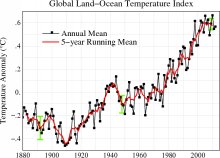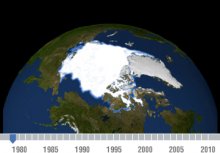Fossil Fuel Environmental Issues
 One of the major environmental problems associated with fossil fuel use is global warming.
One of the major environmental problems associated with fossil fuel use is global warming.
Learning Objective
- Relate fossil fuels to an increase in the earth's temperature
Key Points
- Human energy use has led to an increase in the production of greenhouse gases.
- Humans produce greenhouse gases faster than they can be taken up by carbon users, such as plants.
Terms
- global warming
A sustained increase in the average temperature of the earth, sufficient to cause climate change.
- greenhouse gas
Any gas, such as carbon dioxide or CFCs, that contributes to the greenhouse effect when released into the atmosphere.
- anthropogenic
Having its origin in the influence of human activity on nature.
Full Text
One of the biggest environmental problems associated with fossil fuel use is global warming, which is the rise in the average temperature of Earth's atmosphere and oceans since the late 19th century. Since the early 20th century, Earth's mean surface temperature has increased by about 0.8 °C (1.4 °F), with about two-thirds of the increase occurring since 1980. This warning of the climate system is unequivocal, and scientists are now more than 90% certain that it is primarily caused by increasing concentrations of greenhouse gases produced by human activities such as deforestation and the burning of fossil fuels. These findings are recognized by the national science academies of all major industrialized nations.
Global temperature, 1880-2010
Global temperature has risen steadily since the industrial revolution. The graph shows an increase of about 1 degree Celsius since 1910.
Current Projections of Global Warming
Climate model projections were summarized in the 2007 Fourth Assessment Report (AR4) by the Intergovernmental Panel on Climate Change (IPCC). They indicated that during the 21st century, the global surface temperature is likely to rise another 1.1 to 2.9 °C (2 to 5.2 °F) for their lowest emissions scenario, and 2.4 to 6.4 °C (4.3 to 11.5 °F) for their highest. The ranges of these estimates arise from the use of models with differing sensitivity to greenhouse gas concentrations.
 According to AR4, warming and related changes will vary from region to region around the globe. The effects of an increase in global temperature include a rise in sea levels, a change in the amount and pattern of precipitation, and a probable expansion of subtropical deserts. Warming is expected to be strongest in the Arctic and would be associated with the continuing retreat of glaciers, permafrost, and sea ice. Other likely effects of global warming include a more frequent occurrence of extreme weather events such as heat waves, droughts, and heavy rainfall. Ocean acidification will worsen, and there will also be species extinctions due to shifting temperature regimes. Effects significant to humans include the threat to food security from decreasing crop yields, as well as the loss of habitat from flooding.
According to AR4, warming and related changes will vary from region to region around the globe. The effects of an increase in global temperature include a rise in sea levels, a change in the amount and pattern of precipitation, and a probable expansion of subtropical deserts. Warming is expected to be strongest in the Arctic and would be associated with the continuing retreat of glaciers, permafrost, and sea ice. Other likely effects of global warming include a more frequent occurrence of extreme weather events such as heat waves, droughts, and heavy rainfall. Ocean acidification will worsen, and there will also be species extinctions due to shifting temperature regimes. Effects significant to humans include the threat to food security from decreasing crop yields, as well as the loss of habitat from flooding.
Arctic sea ice loss
This time series, based on satellite data, shows the annual Arctic sea ice minimum since 1979. It shows a steady decrease over time; the September 2010 extent was the third lowest in the satellite record.
Current Efforts Aimed at Reducing Climate Change
Proposed policy responses to global warming include mitigation by emissions reduction, adaptation to its effects, and possible future geoengineering. Most countries are parties to the United Nations Framework Convention on Climate Change (UNFCCC), whose ultimate objective is to prevent dangerous anthropogenic climate change. Parties to the UNFCCC have adopted a range of policies designed to reduce greenhouse gas emissions and to assist in adaptation to global warming. This group has agreed that deep cuts in emissions are required, and that future global warming should be limited to below 2.0 °C (3.6 °F) relative to the pre-industrial level. Reports published in 2011 by the United Nations Environment Programme and the International Energy Agency suggest that efforts as of the early 21st century to reduce emissions may be inadequate to meet the UNFCCC's 2.0 °C target.









